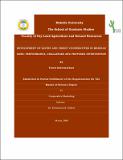| dc.description.abstract | This study is about the development of Savings and Credit Cooperatives in Mekelle Zone. The
fundamental objective of this study is to asses and documents the evolution, performance and
challenges of SACCOs in Mekelle Zone.
A randomly selected seven sample SACCOs were taken to investigate the status, and their
outreach performance based on the commonly accepted growth dimensions: governance, service
delivery, financial performance and institutional capacity. A review of relevant documents and
interview schedule were prepared and administered with randomly selected members and various
committee members.
Employee based SACCOs have laid the foundation in the development of SACCOs in Mekelle.
SACCOs have shown a noticeable increase in number size diversity of membership post the over
through of the command economy. They have increased from 8 prior the end of the command
economy to 24 at present. The average membership per SACCO was 127 at the end of June
2006/7. Women share of membership was 33.3 percent. They have expanded in their type of
membership base to include some community based members such as: small traders and women
traders working in the zone.
Regarding governance of the SACCOs, they have a well-developed by law that portrays the
hierarchical relationship of various committees giving the ultimate ruling power to the general assembly. How ever absenteeism and inactive and inactive participation is commonly observed
in the SACCOs. Besides, women have been under represented in committees and general
assembly meetings are not usually conducted on schedule.
The SACCOs offer limited financial service. The types of the saving products offered by all
SACCOs under the present survey are limited to shares, compulsory deposits and voluntary
deposits. They have exhibited substantial growth in the amount of saving they mobilize and
deposit per member.
The SACCOs offer loans to their members mainly for construction of dwellings, purchase of
house furniture, educational fees, medical and hospitalization expenses with repayment period
ranging between 2 and 3 years. The Interest rate the SACCOs charge is not adequate to cover
fund cost, operating expenses, acceptable range of profit margin and inflation. The SACCOs
have exhibited substantial growth in the amount of loan they disburse. They have achieved good
repayment performance
As far as financial performance is concerned, the saving amount in relation to the total assets for
the SACCOs was found to be with in the range of standard of excellence set by WOCCU. On the
other hand, the members share to total assets was less than the standard of excellence in majority
of the SACCOs. In terms of institutional capital to total asset, they have not maintained the
standard of excellence. The SACCOs data under study reveals no delinquency so far. Majority of
the SACCOs, have maintained the standard of excellence set on operating expense to total asset ratio; on the other hand, the net income to assets was compared unfavorably to the standard of
excellence 10 percent. This is due to the lowest service price they charge to members.
Even though the SACCOs are endowed with well educated members, they lack training and
education opportunities. They gave little emphasis on training committee members. They also
are constrained lack of office, office equipment and facilities.
The factors that that limit the SACCOs’ growth identified in the study were: inadequate support
and weak regulation and supervision, limited expansion in size and type of membership,
inadequate efforts to enhance self governance, limited saving and loan products offered by
SACCOs, absence of non financial services, inadequate service charges, poor financial
performance, absence of training and educational opportunities, lack of office, office furniture
and equipment, and poor record handling and inappropriate information system.
Finally the study has proposed various interventions to be undertaken by stakeholders such as:
training intervention, enabling the SACCOs be self reliant, active regulatory measures,
diversified membership, diversified products, regularly revised service price, and developing
appropriate information system. | en_GB |


